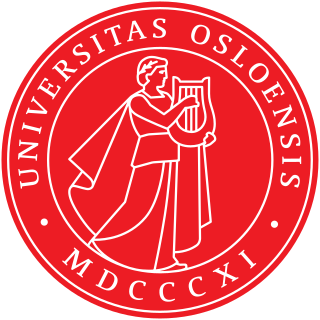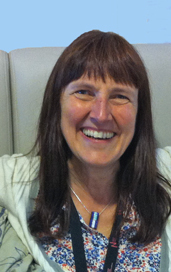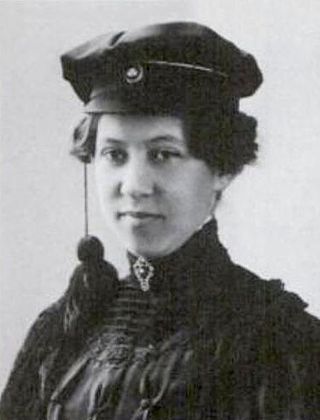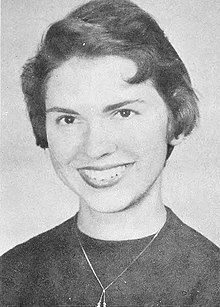
The University of Oslo is a public research university located in Oslo, Norway. It is the oldest university in Norway and consistently considered the country's leading university, one of the highest ranked universities in the Nordic countries and one of world's hundred highest ranked universities. Originally named the Royal Frederick University, the university was established in 1811 as the de facto Norwegian continuation of Denmark-Norway's common university, the University of Copenhagen, with which it shares many traditions. It was named for King Frederick VI of Denmark and Norway, and received its current name in 1939. The university was commonly nicknamed "The Royal Frederick's" before the name change, and informally also referred to simply as Universitetet.

The University of Tartu is a public research university located in the city of Tartu, Estonia. It is the national university of Estonia. It is also the largest and oldest university in the country. The university was founded under the name of Academia Gustaviana in 1632 by Baron Johan Skytte, the Governor-General of Swedish Livonia, Ingria, and Karelia, with the required ratification provided by King Gustavus Adolphus, shortly before the king's death on 6 November in the Battle of Lützen (1632).

Established in 1918, Tallinn University of Technology is the only technical university in Estonia. TalTech, in the capital city of Tallinn, is a university for engineering, business, public administration and maritime affairs. TalTech has colleges in Tartu and Kohtla-Järve. Despite the similar names, Tallinn University and Tallinn University of Technology are separate institutions.

The Peace Research Institute Oslo is a private research institution in peace and conflict studies, based in Oslo, Norway, with around 100 employees. It was founded in 1959 by a group of Norwegian researchers led by Johan Galtung, who was also the institute's first director (1959–1969). It publishes the Journal of Peace Research, also founded by Johan Galtung.

The Norwegian University of Life Sciences is a public university located in Ås, Norway. It is located at Ås in Akershus and has around 7700 students.
Tallinn University is a public research university in Estonia. Located in the centre of Tallinn, the capital city of Estonia, Tallinn University is one of the three largest institutions of higher education in the country. Both QS World University and Times Higher Education rankings place it among the top 1000 universities in the world.

Berit Ås is a Norwegian politician, psychologist, and feminist, who is currently Professor Emerita of social psychology at the University of Oslo. She was the first leader of the Socialist Left Party (1975–1976), and served as a Member of the Parliament of Norway 1973–1977. She was also a deputy member of parliament from 1969 to 1973, and from 1977 to 1981. She is known internationally for articulating the master suppression techniques, and her research interests also include feminist economics and women's culture. She holds honorary doctorates at the University of Copenhagen, Saint Mary's University (Halifax), and Uppsala University, and received the Rachel Carson Prize and the Order of St. Olav in 1997.
Siviløkonom is an academic degree issued within the field of business administration. It consists of a 3 year bachelor's degree followed by a two years masters degree and is also a professional title in Norway, obtained after the total of 5 years of studies. The title is protected and can only be used by persons having met certain qualifications as directed by the Norwegian Ministry of Education and Research. It is mainly offered by nine institutions after the completion of a Master of Science in Business Administration.

The Estonian Academy of Arts is the only public university in Estonia providing higher education in art, design, architecture, media, art history and conservation-restoration. It is based in Tallinn.

The Nordic Women's University is a Nordic research organisation, hosted by Nord University and incorporated as a foundation in Norway. It is involved in "research, teaching and information on and for women, grounded in feminist values and feminist pedagogics and with particular emphasis on Nordic and international perspectives." Established in 2011 on the initiative of former MP Berit Ås and others, the NWU is entirely funded by the Ministry of Education and Research and the Ministry of Children, Equality and Social Inclusion and hosted by one of the 24 Norwegian state university colleges. It received 1 million NOK in initial funding from the two ministries and as of 2012 further 2 million NOK from the Ministry of Education and Research, and receives funding over the State budget of Norway. Its establishment was supported by Tora Aasland, the Minister of Research and Higher Education, and law professor Henning Jakhelln and lawyer and Labour politician Ingjald Ørbeck Sørheim were also involved in the effort.

Margunn Bjørnholt is a Norwegian sociologist and economist. She is a research professor at the Norwegian Centre for Violence and Traumatic Stress Studies (NKVTS) and a professor of sociology at the University of Bergen. Her research has focused on financial institutions, management and working life and later on gender equality, migration and violence. She has also worked as a consultant, a civil servant, served as an expert to the European Commission and been president of the Norwegian Association for Women's Rights.

Ellen Gleditsch was a Norwegian radiochemist and Norway's second female professor. Starting her career as an assistant to Marie Curie, she became a pioneer in radiochemistry, establishing the half-life of radium and helping demonstrate the existence of isotopes. She was Vice President of the Norwegian Association for Women's Rights 1937–1939.

Candidate is the name of various academic degrees, which are today mainly awarded in Scandinavia. The degree title was phased out in much of Europe through the 1999 Bologna Process, which has re-formatted academic degrees in Europe.

Elise Sem was a Norwegian barrister, women's activist and sports official. She was the first female attorney in Europe and the first female barrister in Norway.
Pornification is the absorption by mainstream culture of styles or content of the sex industry and the sexualisation of Western culture, sometimes referred to as raunch culture. Pornification, particularly the use of sexualised images of women, is said to demonstrate "how patriarchal power operates in the field of gender representation". In Women in Popular Culture, Marion Meyers argues that the portrayal of women in modern society is primarily influenced by "the mainstreaming of pornography and its resultant hypersexualization of women and girls, and the commodification of those images for a global market". Pornification also features in discussions of post-feminism by Ariel Levy, Natasha Walter, Feona Attwood, and Brian McNair. Pornography began to move into mainstream culture in the second half of the 20th century, now known as the Golden Age of Porn. Several Golden Age films referred to mainstream film titles, including "Alice in Wonderland" (1976), "Flesh Gordon" (1974), "The Opening of Misty Beethoven" (1976) and "Through the Looking Glass" (1976). Pornification is a product of the widespread availability of porn on the internet.
Lynda Garland is a scholar and professor at the University of Queensland. Her research focuses on female images in the Late Antiquity period and Byzantine Society.
Aili Annikki Nenola is professor emerita of the University of Helsinki. Her research specialty was folklore and she pioneered multidisciplinary and critical women's studies in Finland, designing the curricula and introducing courses at the University of Tartu. She later assisted in establishing the national curricula for women's studies, became director of the graduate program in women's studies at the Kristiina Institute, and secured accreditation of the field as a degree major. Nenola was also a participant in creating the curriculum of the Women's Studies Centre of Vilnius, Lithuania. From 1995 to 2006 she taught women's studies at the University of Helsinki and simultaneously served as the Dean of the Faculty of Humanities between 2004 and 2006. In 1999, Nenola was honored as a Knight, first class, of the Order of the White Rose of Finland and was elected to the Finnish Academy of Science and Letters in 2002.
Feride Acar is a Turkish international expert on women and gender. She was the founding chair of the Middle East Technical University's gender and women's studies program. Between 2003 and 2005 served as chair of the Committee on the Elimination of Discrimination against Women and served three consecutive terms as president of the Council of Europe's Group of Experts of Action against Violence against Women and Domestic Violence (GREVIO). In 2019, she was awarded the Pro Merito Medal of the Council of Europe for her service to that body in advancing women's rights.

Aadel Marie Brun Tschudi was a Chinese-born Norwegian geographer and sinologist who taught at the University of Oslo, successfully focusing on social geography. During a trip to East Asia in 1957, she contributed a series of reports to the Norwegian broadcaster NRK and on her return published her impressions of the country in Japan, soloppgangens land. She became involved in research projects in support of Botswana, Sri Lanka and her native China. From 1967 to 1973, she edited the Norwegian Journal of Geography and in 1977 became a member of the Norwegian Academy of Science and Letters. That year, following the end of the Cultural revolution, she travelled back to Yiyang to meet her family, report on her visit in Gjensyn med Kina.













